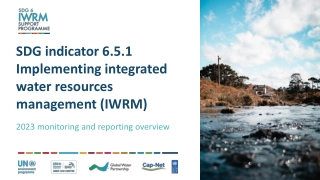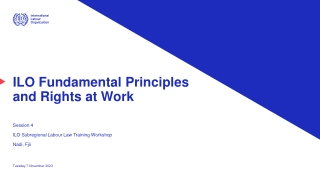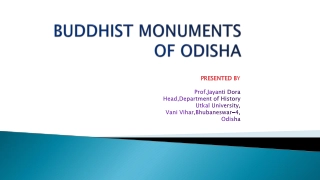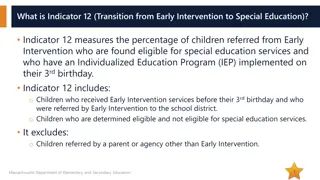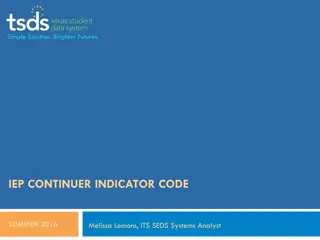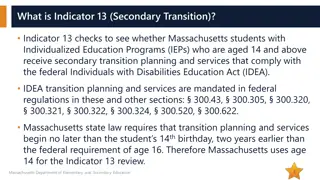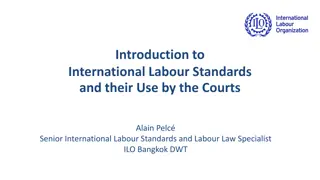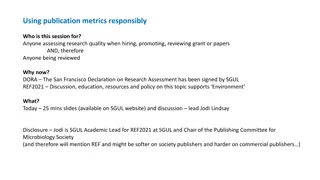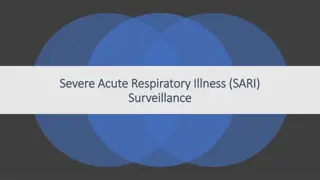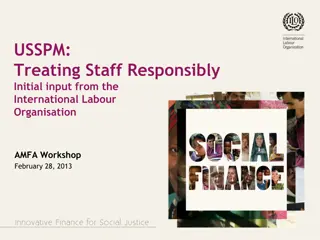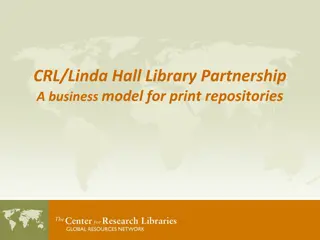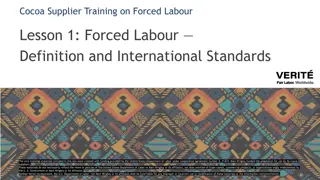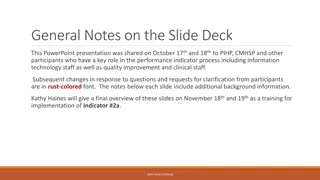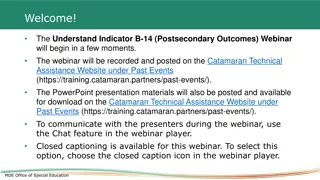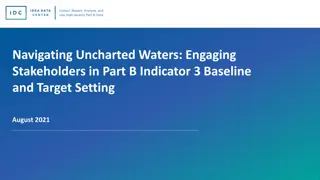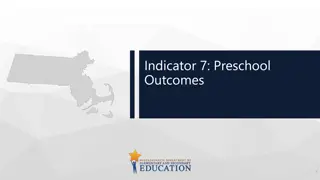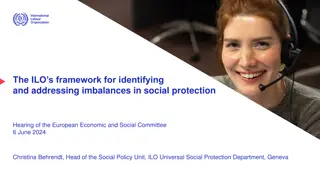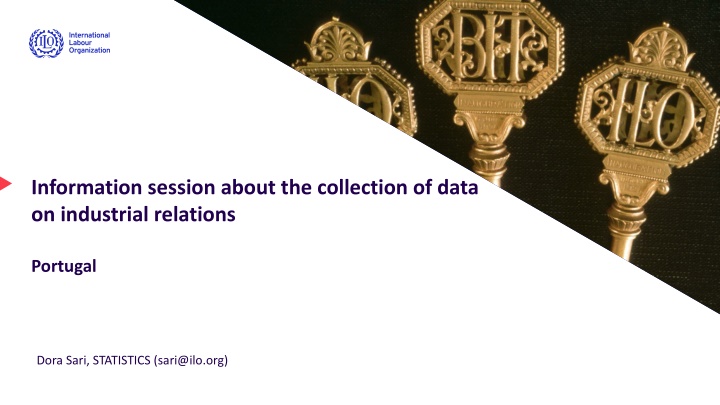
Data Collection on Industrial Relations in Portugal - Overview & Insights
Explore the collection of data on industrial relations in Portugal, focusing on qualitative data and indicators related to national compliance with labor rights. Learn about SDG 8.8.2 and how the UN General Assembly and ILO have been working on methodologies to promote decent work and protect labor rights globally. Discover how country-level compliance with freedom of association and collective bargaining rights is measured and reported. Dive into the statistical foundation provided by ILO textual sources and understand the importance of advancing social justice and promoting decent work.
Download Presentation

Please find below an Image/Link to download the presentation.
The content on the website is provided AS IS for your information and personal use only. It may not be sold, licensed, or shared on other websites without obtaining consent from the author. If you encounter any issues during the download, it is possible that the publisher has removed the file from their server.
You are allowed to download the files provided on this website for personal or commercial use, subject to the condition that they are used lawfully. All files are the property of their respective owners.
The content on the website is provided AS IS for your information and personal use only. It may not be sold, licensed, or shared on other websites without obtaining consent from the author.
E N D
Presentation Transcript
Information session about the collection of data on industrial relations Portugal Dora Sari, STATISTICS (sari@ilo.org)
2 Qualitative data and indicator IRLex SDG 8.8.2 Legal Database on Industrial Relations Level of national compliance with labour rights (freedom of association and collective bargaining) based on International Labour Organization (ILO) textual sources and national legislation, by sex and migrant status Composed of 7 sections covering regulatory framework for freedom of association and collective bargaining 57 countries updated to 2019 https://www.ilo.org/dyn/irlex/en/f?p=14100:1: 0::NO::: Advancing social justice, promoting decent work
3 SDG 8.8.2 2017: UN General Assembly approves the final list of indicators for the 17 SDG goals and 169 targets SDG 8.8.2: Inter-agency and Expert Group on SDG indicators requested the methodology to be discussed at the ICLS 2018 to adopt an internationally-agreed methodology Informal consultation within the ILO (three rounds of bipartite consultations in 2017 and one tripartite consultation in 2018) International Conference of Labour Statisticians 2018 approved the methodology proposed for SDG 8.8.2 ILO Governing Body (March 2019) endorses the recommendations of the ICLS (GB.335/INS/14/1) SDG Goal 8 Promote sustained, inclusive and sustainable economic growth, full and productive employment and decent work for all SDG Goal 8, target 8.8 Protect labour rights and promote safe and secure working environments for all workers, including migrant workers, in particular women migrants, and those in precarious employment Advancing social justice, promoting decent work
4 SDG 8.8.2 Measures country level compliance with freedom of association and collective bargaining rights as defined in the various ILO textual sources (e.g. ILO Constitution, C87 and C98) Collected on an annual basis and is reported with a two-year lag. Available for 2015- 2017(2018). The statistical foundation are the ILO textual sources (which are based on information provided by the Governments, workers and employers organizations), thus the data collection is carried out by the Office and not by the national statistical Offices The data is provided by the Office as an input for the UN SDG reports Metadata:https://unstats.un.org/sdgs/metadata/files/Metadata-08-02-01.pdf Data:https://unstats.un.org/sdgs/indicators/database/ Advancing social justice, promoting decent work
5 SDG 8.8.2 The indicator is based on the coding of 6 ILO textual sources (and national legislation for non-ratifiers) against 180 evaluation criteria. ILO textual sources: a. Reports of the Committee of Experts on the Application of Conventions and Recommendations; b. Reports of the Conference Committee on the Application of Standards; c. Country Baselines under the ILO Declaration Annual Review; d. Representations under article 24 of the ILO Constitution; e. Complaints under article 26 of the ILO Constitution f. Report on the Committee on Freedom of Association. g. National legislation (only for countries that have not ratified either or both ILO Convention no. 87 and 98) 180 evaluation criteria: 103 for workers and their organizations and 77 for employers organizations Evaluation criteria are split between in law and in practice non-compliances Advancing social justice, promoting decent work
6 SDG 8.8.2 Transparency: the coded text can always be readily traced back to individual textual sources Indicator 8.8.2 normalized score of the sum of weighted violations in law and in practice. score from 0 to 10 (0 being the best possible score and 10 being the worst possible score) default worst possible score of 10: all-encompassing violations of freedom of association and collective bargaining rights SDG indicator 8.8.2 is not intended as a tool to compare compliance among ILO member States. It should specifically be noted that reporting obligations of an ILO member State to the ILO s supervisory system and thus ILO textual sources are different for ratifying and non-ratifying ILO member States. Progress is measured through the decrease in the reported scores. The ILO s supervisory system and reporting obligation is the means through which Governments, workers and employers organizations can submit the necessary information Advancing social justice, promoting decent work
7 Observation (CEACR) - adopted 2018, published 108th ILC session (2019) Right to Organise and Collective Bargaining Convention, 1949 (No. 98) - XXX (Ratification: XXX) Articles 4 and 6 of the Convention. Scope of the Convention. Agricultural workers and dockworkers. The Committee noted previously the Government s intention to pursue revision of the General Labour Act, Title XI of which contains provisions on collective bargaining and the adoption of measures to guarantee agricultural workers and dockworkers the rights laid down in the Convention. The Committee notes that, in its report, the Government states that the revision of the legislation is still in process. The Committee noted previously the Government s statement that the draft Labour Code provided for adaptation of the application of its provisions to the specific characteristics of the work performed by agricultural workers and dockworkers. The Committee requests the Government to provide information on the status of the draft legislation and trusts that it will guarantee for agricultural workers and dockworkers the rights laid down in the Convention. [65: In law exclusion of other workers from the right to collective bargaining, in law] Evaluation criteria Textual coding Binary coding Weights Binary coding x Weights II a. Right of workers to establish and join organizations in law 24 Exclusion of workers from the right to establish and join organizations 30 Lack of adequate legal guarantees against anti-union discriminatory measures II b. Right of workers to establish and join organizations in practice 37 Previous authorization requirements 42 Committed against trade union officials re violation No. 41 43 Lack of guarantee of due process and/or justice re violation No. 41 abf 1.86 1.86 1 a 1.75 1.75 1 af f 1.70 1.89 1.70 1.89 1 1 ab 1.80 1.80 1 Advancing social justice, promoting decent work
Information session about the collection of data on industrial relations Portugal Dora Sari, STATISTICS (sari@ilo.org)

